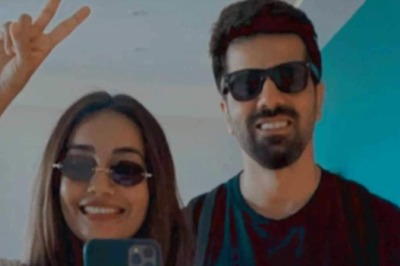
views
New Delhi: In the age of fast love, multiple relationships and early maturity, the 'pill' or the oral contraceptive has become the woman's most intimate friend. And a first-of its kind art project, featuring works by leading contemporary Indian and international artists will celebrate 50 years of the pill in the capital.
The exposition beginning Jan 22 will try to bring out the dilemma and the debate surrounding the pill. It includes works by artists like Abir Karmakar, Ayesha Durrani, Jaishri Abhichandani, Kaif Ghaznavi, Mithu Sen, Nandita Kumar, Sarnath Banerjee, Swati Khurana, Tazeen Qayyum, Tushar Joag and Vito Tumbarello.
The pill is linked to the worldwide movement for women's empowerment and debate by conservatives. The contraceptive pill was first approved as a birth control measure in the US in 1960. However, it found social acceptance a year later in 1961 and became a new age phenomenon.
And over 100 million women use it worldwide now, according to a study in the US.
History cites that sporadic researches in 1930s to synthesize plant hormones for a viable hormonal contraceptive bore fruit in 1960 when the US-based Food and the Drug Administration approved Enovid 10, a contraceptive manufactured by Searle.
Pakistani artist Tazeen Qayyum's mixed media installation "It's complicated" uses 10 rubber bottles filled with varying degrees of hot water to represent the female body, which she says is "precious and designed for comfort".
Accompanying the installation, is a sculptural piece "Thee Only Do I Love" made of commercial ice bags. Each canvas bag is painted with images of flowers, such as myrtle, purple violet and jonquil, which in Western symbolism are associated with fidelity in love and faithfulness.
"The work in this show is an observation of the challenges faced by women around me living in a 'progressive nation', where abuse has a different face compared to the society I came from. I see constant struggles with issues of relationships, sexuality, love, equality, health, politics, comfort and stability," Qayyum said at a media preview.
US-based Indian artist Jaishri Abhichandani's mounted wall installation "No Way Home" is a composition of leather whips, paint, wire and jewels. It focuses on the female body and feminine identity. The piece uses a number of whips wound together and embellished in crystals.
According to Abhichandani, who has been commenting on the law banning abortion in several US states, the installation is a contemporary reworking of one of her most controversial sculptures "Roe vs. Wade", which takes its title from the controversial American Abortion law of 1973. It is symbolic of the confused female sexuality.
Lahore-based Pakistani artist Kaif Ghaznavi has created a photographic installation, "Maang" - a collage-like composition of nearly 50 8x8 inch photographs.
"My work considers situations of anxiety and fear, loss of place and identity...I strive to realize what behaviour can be engaged in to increase the feminine power, her well being and vitality," the artist said.
Two sculptors by New York-based artist Swati Khurana use "pill boxes", "bindis" and "embroidery hoops with drawings".
Christened "Family Planning", it comments on reproduction and adornment.
Delhi-based graphic novel writer and designer Sarnath Banerjee adopts "the curatorial note of the show to intervene into the concept of the pill through a series of elaborate drawings".
The drawings are an interpretation of the note.
Curator Avni Doshi said: "The pill, as an icon for the modern woman, has an exclusionary aspect in that it presupposes a monogamous sexuality, performed by a man and a woman. A categorical acceptance of the pill as the most important discovery of the last century would not be compelling given the global dilemma created by many sexually transmitted diseases," she said.
The expose will be presented by Delhi-based gallery Latitude 28 and will be on till Feb 15.
"The showcase was an opinion in favour of women's choice of freedom - reproductive, professional and personal spheres of life. In India, the pill and the allied issues of sexuality that it raised are under layers. There is controversy about it as in the US. When curator Avni Doshi came to me with the concept, I felt we should talk about it in India," Bhavna Kakar, Latitude 28 director, told IANS.














Comments
0 comment